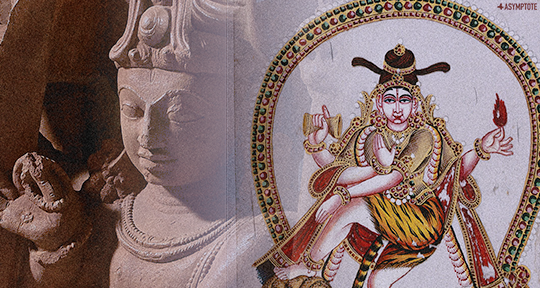In our new column, Retellings, Asymptote presents essays on the translations of myths, those enduring stories that continue to transform and reincarnate. In this essay, Kanya Kanchana follows the whirling story of Śiva through dance, science, and myth.
“A life in which the gods are not invited is not worth living. It will be quieter, but there won’t be any stories.”
– Roberto Calasso,
The Marriage of Cadmus and Harmony
There was sound and the sound was colossal. From within the pulsing sound, from the heart of the creation and dissolution of the cosmos, a single beat could be heard—ḍam. Incantatory, the beat started to repeat—ḍam ḍam ḍam ḍam ḍam ḍam ḍam. The beat was coming from the ḍamaru, a small handheld drum. There was a god and he was dancing. He was Śiva and he shook all the worlds.
His matted locks flew wild. Gaṅgā, the holiest of rivers who was nestled in them, swelled in spate, tried in vain to keep him cool. The lambent crescent moon that adorned them, intoxicating soma, now glinted crazily. Vāsukī, the great serpent coiled around his blue, kālakūṭa-holding throat, reeled. Śiva’s locks were a forest (jaṭa, matted locks; aṭavī, forest, as the asura king Rāvaṇa sings).
Once upon a time, another forest: a forest of cedars (devadāru, wood of the gods, Cedrus deodara), into which Bhikṣāṭana Śiva, the mendicant, wanders naked, deep in despair for the sin of having killed Brahmā, his outheld palm an escutcheon, Brahmā’s skull still stuck to it somewhat like an alms bowl. The illustrious sages in the forest are not pleased to see this beautiful beggar who drives their women mad with desire. They send a tiger to shred him to bits; he flays the tiger and wears its bloody skin around his waist. They throw venomous serpents at him; he wraps them around himself as sinuous ornaments. They send a demon dwarf, the malign Muyalaka. Śiva steps on him and breaks his back. And then he dances. He dances until it dawns on them that he is none other than Śiva.

